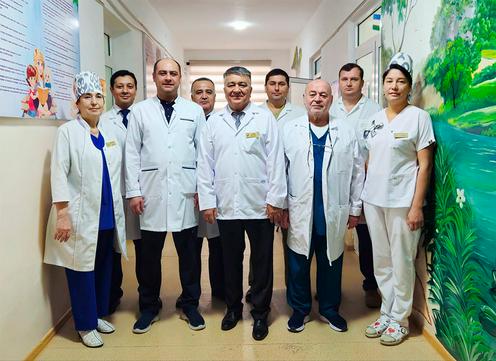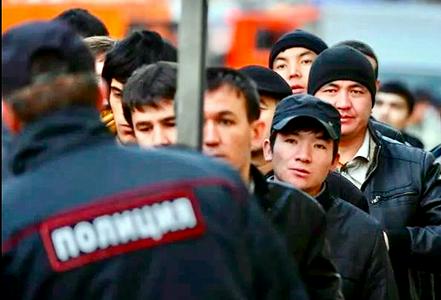 Video still from the press service of the Ministry of Health of Uzbekistan Photo: Ministry of Health of Uzbekistan
Video still from the press service of the Ministry of Health of Uzbekistan Photo: Ministry of Health of Uzbekistan
Doctors who performed a successful surgery to separate conjoined twins have been awarded the badge of honor “Excellence in Healthcare of the Republic of Uzbekistan,” the Ministry of Health reported.
The separation surgery was performed just nine hours after birth and lasted five hours. The procedure was led by Doctor of Medical Sciences and Professor Bakhtiyor Ergashev, head of the Center for Neonatal Surgery at the Republican Perinatal Center.
The unique operation took place at a branch of the Republican Specialized Scientific and Practical Medical Center for Maternal and Child Health, located in Chirchik, Tashkent Region.
The press service of Uzbekistan’s Ministry of Health has released details of the operation to separate conjoined twins, performed at a branch of the Republican Specialized Scientific and Practical Medical Center for Maternal and Child Health in Chirchik, Tashkent Region.
The parents learned of the anomaly at 23 weeks of pregnancy during an ultrasound examination. Doctors explained all possible risks and prognoses, but the family decided to fight for the babies’ lives. From that moment on, leading specialists of the Republican Perinatal Center remained in constant contact with them.
The conjoined twins, two girls joined at the abdomen and umbilical region, were born prematurely at 33–34 weeks via cesarean section and were immediately referred to surgeons. Their combined birth weight was 3,400 grams, and their lengths were 41 and 40 centimeters.
In the first hours after birth, doctors found their condition to be extremely critical: no echo signs of a bladder were detected, one of the girls lacked a large intestine, and the skin at the junction of their bodies had split in two places, causing leakage of abdominal fluid. According to Professor Bakhtiyor Ergashev, head of the Center for Neonatal Surgery at the Republican Perinatal Center, this created a high risk of peritonitis and threatened the lives of both infants.
“In such a critical situation, there was no alternative. Had the surgery not been performed immediately, both newborns could have died,” Ergashev emphasized.
The procedure lasted five hours from 7:30 p.m. to 12:30 a.m., and involved 12 specialists: surgeons, anesthesiologists, resuscitation specialists, neonatologists, and operating-room nurses from the Republican Perinatal Center, the multidisciplinary clinic of Tashkent State Medical University, and medical institutions of Tashkent Region.
During surgery, doctors discovered that the twins shared a large intestine and bladder, connected through a urachus. The large intestine was preserved for the older girl due to vascular considerations, while the bladder and connecting tissue were carefully separated, and temporary stomas were placed for both patients.
Uzbek Health Minister Asilbek Khudayarov visited the medical facility, reviewed the children’s condition, and personally thanked the surgical team.
“Such complex surgeries are rarely performed, even in countries with advanced medical systems. They typically require lengthy preparation and extensive analysis. This urgent and successful separation of conjoined twins with severe congenital anomalies—performed at a regional level—clearly demonstrates that our national healthcare has reached a new stage of development,” Khudayarov said.
The minister presented the members of the surgical team with the “Excellence in Healthcare of the Republic of Uzbekistan” badge in recognition of their professionalism and contribution to medical science.
The twins’ condition is reported as stable. During rehabilitation, they received round-the-clock care, intensive therapy, and medical support, and have since been discharged home.
The first operation to separate conjoined twins not only in Uzbekistan but in all of Central Asia was carried out in 2006 with the participation of specialists from the Russian Scientific Center of Surgery named after Academician B. V. Petrovsky. That 16-hour operation separated four-month-old twins Hasan and Khusan Kamiljanov from Khorezm Region, who were joined at the lower chest and abdomen with a shared liver.
In December 2022, a team of Uzbek surgeons led by Professor Bakhtiyor Ergashev operated on five-month-old sisters Fotima and Zukhra from Kyrgyzstan, who were joined at the abdomen and shared a liver. It was the first such procedure performed entirely by Uzbek doctors. Those specialists were also awarded “Excellence in Healthcare” badges and certificates of honor.
“Of course, our previous experience helped us this time,” said Ergashev. “But the two cases cannot be compared. In 2022, the twins were seven months old and weighed about 10 kilograms. We had time to prepare thoroughly. They were joined at the liver, and separating it took about an hour and a half; the whole operation lasted almost three hours. This time, however, the situation was far more complex: the newborns were premature, and they shared both the intestine and the bladder. It required exceptional precision and care. Despite all the challenges, thanks to the experience, dedication, and teamwork of Uzbek doctors, the operation was a success.”









